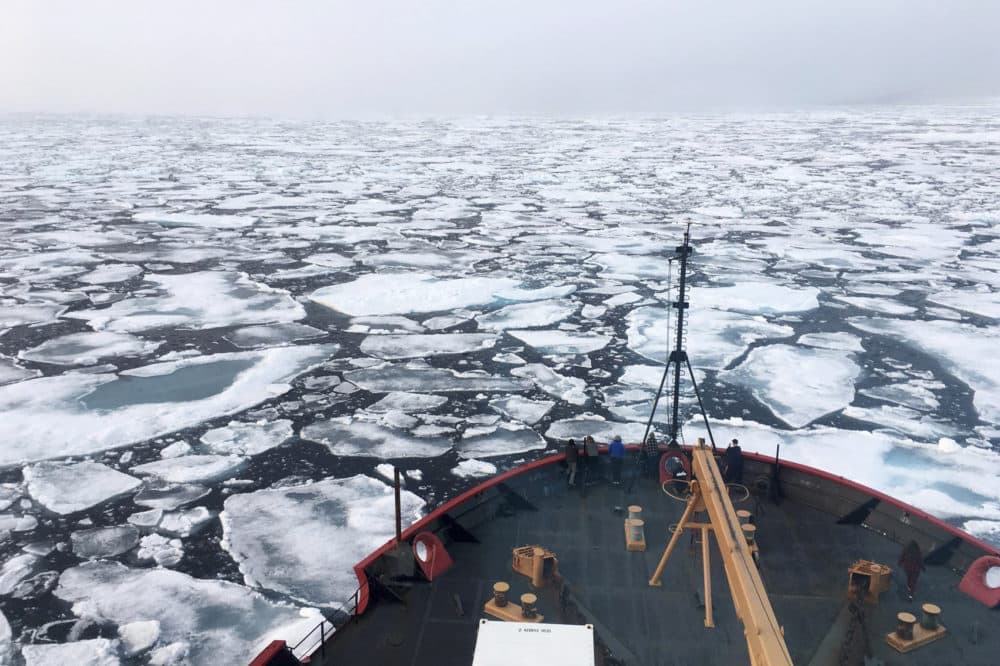Advertisement
Arctic Warming Pushes The Region — And Planet — Into Uncharted Territory

With Meghna Chakrabarti
Warming in Arctic raises fears of a "rapid unraveling" of the region. Reindeer numbers crash by half. We’ll confront the climate emergency in the Arctic.
Guests
George Divoky, founder and director of Cooper Island Arctic Research. (@CooperIslandAK)
Karen Frey, polar scientist and a director at Clark University’s Graduate School of Geography. Lead author of the "Arctic Ocean Primary Productivity" chapter in this year’s NOAA Arctic Report Card. (@ClarkUniversity)
From The Reading List
New York Times: "Warming in Arctic Raises Fears of a ‘Rapid Unraveling’ of the Region" — "Persistent warming in the Arctic is pushing the region into “uncharted territory” and increasingly affecting the continental United States, scientists said Tuesday.
"'We’re seeing this continued increase of warmth pervading across the entire Arctic system,' said Emily Osborne, an official with the National Oceanic and Atmospheric Administration, who presented the agency’s annual assessment of the state of the region, the 'Arctic Report Card.'
"The Arctic has been warmer over the last five years than at any time since records began in 1900, the report found, and the region is warming at twice the rate as the rest of the planet."
Politico: "Trump Says Climate Change Isn’t Real. My Trip to the Top of the World Proved Otherwise." — "It felt like the top of the world in more ways than one. It was my last evening in Barrow, now Utqiagvik, Alaska, the northernmost community in the United States. I borrowed skis, a skijoring harness, and an eager young husky named Namik and set out onto the shore ice that extended for two miles into the Chukchi Sea.
"It was such a night and such a light as cannot be imagined at lower latitudes. The unsetting late-April sun shimmered through floating ice crystals. I thought I glanced colors—blue, pink and gold—glowing teasingly in this translucent scrim, but when I stared I saw only soft light and shadow.
"When the way is smooth, joring is a blast—the ski equivalent of cycling with one hand gripping a truck gate; the dog pulls, you pole and kick, and the two of you fly over the snow. Plus, I thought shamefully, Namik would likely smell a polar bear before I saw it and distract it while I got away.
"I’d hoped to get within sight of the ice’s edge, but the ridges pushed up by the shifting ice finally grew too steep to cross and too numerous to go around; I marveled at how the old explorers had labored, pushing heavy sleds over hundreds of miles of the stuff. And so I turned around."
Independent: "Arctic has experienced five warmest years on record, says US government agency" — "The Arctic has been warmer for the past five years than at any other point since 1900 when records began, according to a US government agency report.
"Dramatic changes are being felt across the polar region as global warming triggers knock-on effects from earlier plankton blooms to more extreme weather.
"The Arctic experienced its second warmest air temperatures and second lowest sea-ice coverage in 2018.
"Polar temperatures are rising at roughly double the rate of the global average, and according to scientists behind the latest analysis this is causing 'unexpected' changes in the environment."
USA Today: "Almost all of the oldest, thickest ice in the Arctic Ocean is gone due to climate change" — "Earth's 'air conditioner' is going haywire.
"Due to climate change, temperatures in the Arctic are among the warmest on record, and the amount of sea ice there is close to its all-time lowest level, federal scientists announced in a report Tuesday.
"In fact, Arctic air temperatures over the past five years (2014-18) have exceeded all previous records since 1900, and the area is warming at two times the rate of other places on Earth.
"The report was prepared by the National Oceanic and Atmospheric Administration (NOAA), a branch of the U.S. Department of Commerce.
"Overall, the Arctic is enduring 'its most unprecedented transition in human history,' said report lead author Emily Osborne of NOAA at a press briefing on Tuesday."
NBC News: "Trump team advocates burning fossil fuels, even as U.S. scientists sound alarm on melting Arctic" — "The Trump administration continued its rejection of mainstream climate science — and embraced Earth-warming fossil fuels — in the second week of the United Nations climate conference in Poland. Those contrarian views emerged even as U.S. government scientists on Tuesday reported that humanity’s actions are driving up temperatures rapidly, with devastating impacts for the Arctic and the rest of the globe.
"Negotiations continued this week among diplomats from 200 nations in the industrial city of Katowice, trying to reach an agreement in which countries commit to greater reductions of greenhouse gases. The U.S. is party to those talks behind closed doors, even as Trump and his representatives question the scientific consensus on global warming.
"Over the weekend, the U.S. joined Russia, Saudi Arabia and Kuwait as the only countries that declined to 'welcome' an international report on the destructive fallout that will occur if temperature increases can't be limited to 1.5 degrees Celsius over pre-Industrial levels. All four nations export oil, and the report called for fossil fuels to be phased out by 2050."
Stefano Kotsonis produced this show for broadcast.
This program aired on December 13, 2018.